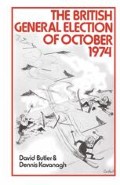Abstract
The election campaign lacked colour. It was the second in seven months and many people were bored. The weather was bad1 and meetings were poorly attended. The politicians tried to change their style and to liven up the battle but they received little help from outside events. No international crisis or domestic development provided a peg for party points. A continuing strike at seven Ford plants, a fresh set of EEC statistics, a bomb outrage at Guildford and an eve-of-poll burglary at Liberal headquarters all offered some new material for questions at the parties’ press conferences; but the main basis for argument lay in the words of the politicians themselves.
Access this chapter
Tax calculation will be finalised at checkout
Purchases are for personal use only
Preview
Unable to display preview. Download preview PDF.
Notes
On the problems of co-ordination between Mr Wilson and Transport House in the 1970 election see The British General Election of 1970, pp. 59–61,
and Marcia Williams, Inside Number Ten (London, 1972).
Author information
Authors and Affiliations
Copyright information
© 1975 David Butler and Dennis Kavanagh
About this chapter
Cite this chapter
Butler, D., Kavanagh, D. (1975). The Quiet Campaign. In: The British General Election of October 1974. Palgrave Macmillan, London. https://doi.org/10.1007/978-1-349-02539-8_5
Download citation
DOI: https://doi.org/10.1007/978-1-349-02539-8_5
Publisher Name: Palgrave Macmillan, London
Print ISBN: 978-1-349-02541-1
Online ISBN: 978-1-349-02539-8
eBook Packages: Palgrave Political & Intern. Studies CollectionPolitical Science and International Studies (R0)

